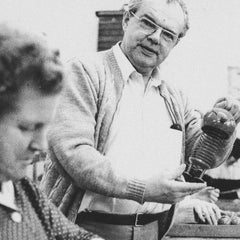hoptimist | animals | cat oak
hoptimist | animals | cat oak
Dimensions: 5.9 x 7.3cm high
Material: oak
-
ready to ship
more stock due mid July
Usually cats go their separate ways, but our Hoptimist cat knows where you stand. It only bounces a little on the spot if you pat it on the head. A wonderful gift idea for anyone who loves cats. Yes, even the real cat of the house will probably not be able to resist pouting at the new playmate. The item is produced in FSC®-certified oak (FSC-C166612).
Animals awaken something in all of us. A joy that we share with each other. Therefore, of course, there are also the cutest animals among the large family of happy Hoptimists.
With a strong belief in the power of the smile, Gustav Ehrenreich created his happy Hoptimist movement in the late 1960s. The goal was to create a figure that was a perpetual reminder to remain positive and optimistic. Because although the 1960s are often referred to as 'the swinging 60s', the decade was characterised by unrest. Therefore, Ehrenreich's design brought joy in an otherwise turbulent time.

Click for more ideas from BRAND | Hoptimist
In the late 1960s, Gustav Ehrenreich created the happy movement that has since found a place in Danish design history. Today there is a happy Hoptimist for every occasion. That's why you can always find a Hoptimist who wants to please wherever it ends up. That is the whole idea behind the Hoptimists: To spread joy and put smiles on everyone's lips.
Today, when we further develop the design, we do so in the spirit of Ehrenreich. His basic idea was to draw the Hoptimists based on a circle and an ellipse, and that idea underlies both the classics and the new generation of figures.
Before the Hoptimists saw the light of day, the Danish woodturner Hans Gustav Ehrenreich tinkered in his workshop in the house n Stilling.
It was at the end of the 1950s, and in the small workshop "Ehrenreichs Trækunst" the imagination was great. No two things were ever the same. Small silver fish were inlaid in hand-turned bowls and dishes, and unique handicrafts in woods from all over the world were sold from the workshop.
In the late 1960s, Ehrenreich created the first prototypes for Birdie, Bimble and Bumble. Soon Ehrenreich and his Hoptimists became too familiar with what the small workshop could produce. The rest of that story has today become Danish design history.
In 2009, the Hoptimist was relaunched, and today the figures are jumping again in both Denmark and the rest of the world. When they develop the design today, they do so in Ehrenreich's spirit. His basic idea was to draw the Hoptimists based on a circle and an ellipse, and that idea underlies both the classics and the new generation of figures.
 Click for more ideas from Hans Gustav Ehrenreich (designer)
Click for more ideas from Hans Gustav Ehrenreich (designer)Before the Hoptimists saw the light of day, the Danish woodturner Hans Gustav Ehrenreich tinkered in his workshop in the house on in Stilling, Denmark.
It was at the end of the 1950s, and in the small workshop 'Ehrenreichs Trækunst' the imagination was great. No two things were ever the same. Small silver fish were inlaid in hand-turned bowls and dishes, and unique handicrafts in woods from all over the world were sold from the workshop.
- Free delivery australia-wide (does not apply to bulky products) Top3 members receive free standard delivery Australia-wide for orders over $100
-
ready to ship
more stock due mid July










